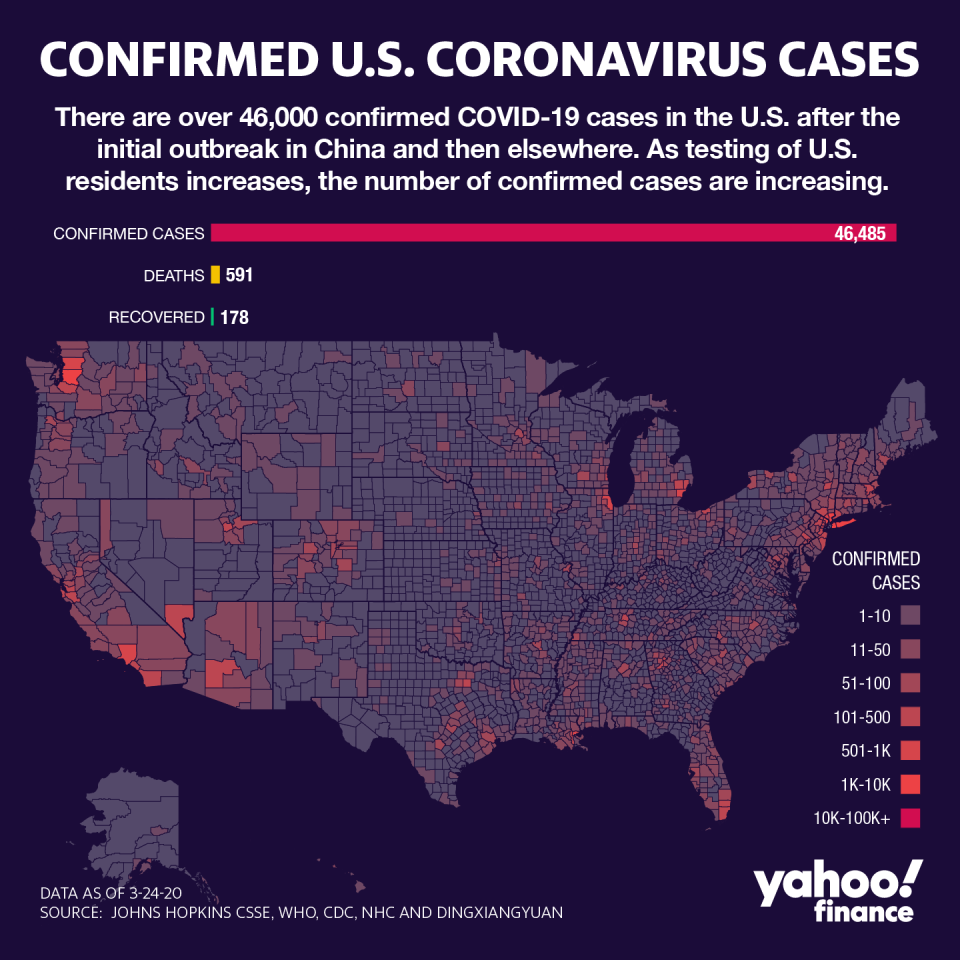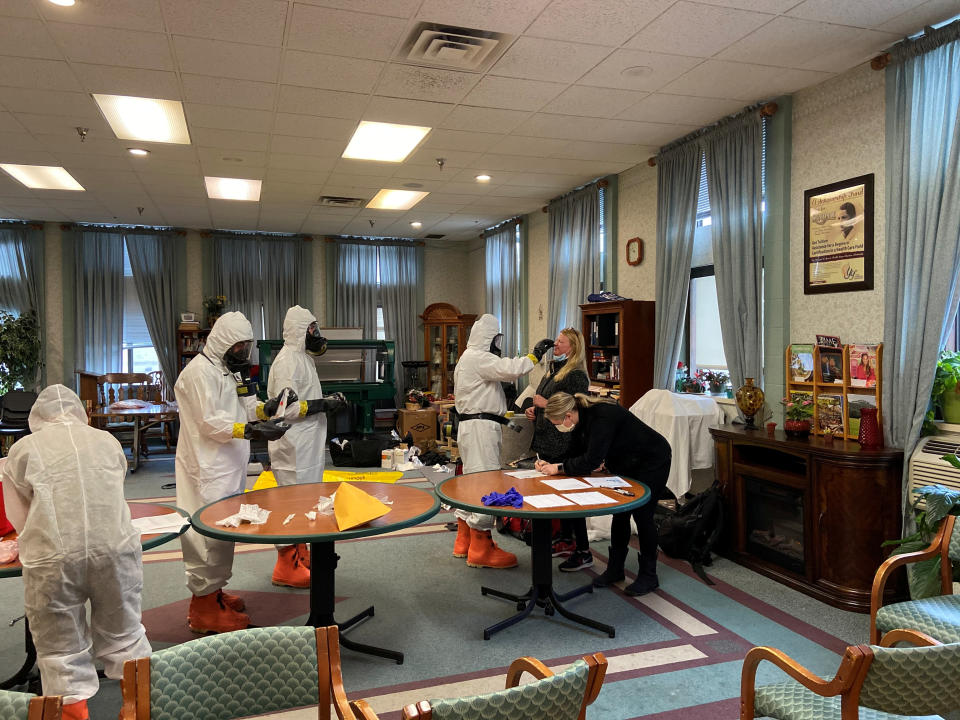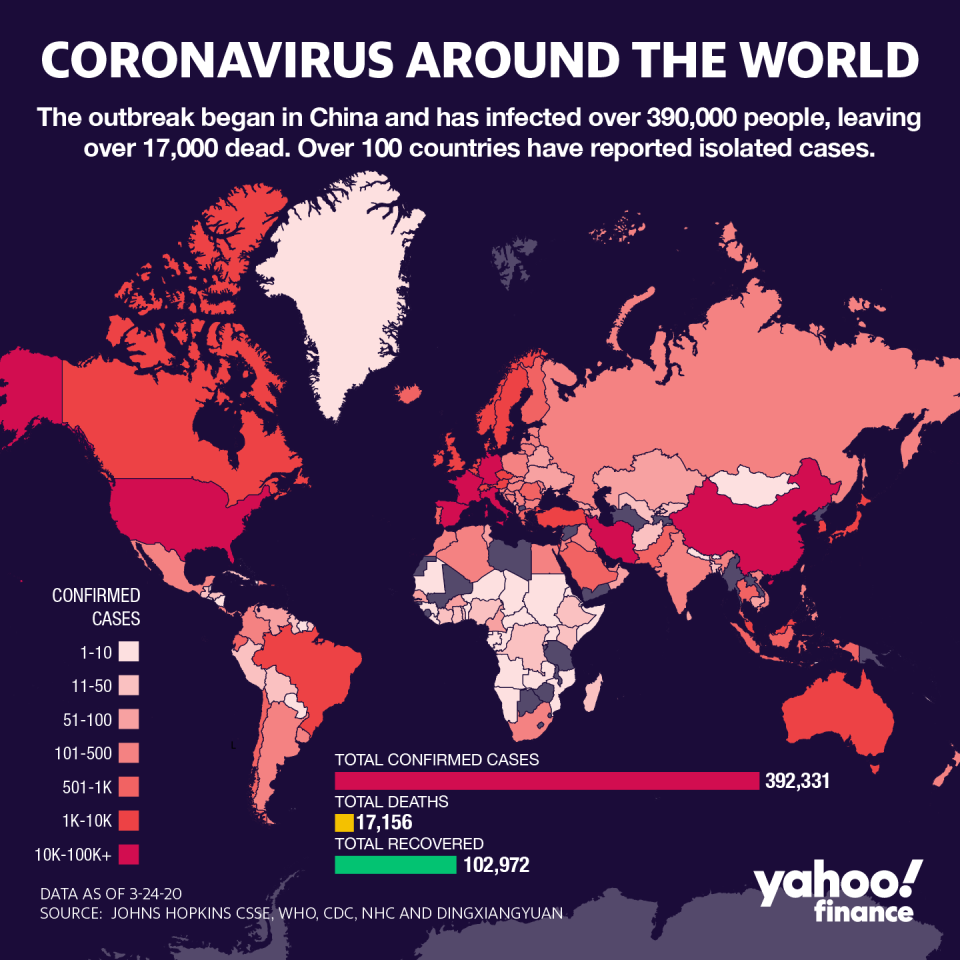Here's how U.S. coronavirus testing is working
As the U.S. grapples with a severe delay in coronavirus testing and screening, official efforts to crack down on large gatherings and keep citizens indoors — otherwise known as social distancing — may help reduce the strain of the outbreak on health services. It is also a key factor in mitigating the spread of COVID-19.
Recently, the Food and Drug Administration approved molecular diagnostic testing by Roche, Thermo Fisher, and Abbott which is expected to bolster U.S. efforts to find more coronavirus cases.
The FDA also approved a new point-of-care molecular diagnostic test from Danaher Corporation’s (DHR) Cepheid, and is now allowing self-swab tests in a clinical setting — a move aimed at preserving much-needed protective gear.

Swab mail-in testing
The FDA has now approved two types of testing swab samples, with several more in the queue. The agency has also allowed state health departments to approve tests from labs and research facilities at the state level, which would boost the availability of tests that have quicker turnaround times.
The first type of test the Centers for Disease Control (CDC) rolled out require multiple swabs to be taken from the back of the throat, which are then sent through a logistics network to labs to be tested.
Initially, it took several days to receive the test results. But after the CDC began providing testing kits to public labs and state health labs, it reduced the amount of turnaround time to a couple of days.
The swabs themselves can be taken at any health care facility, which first must receive approval to test samples. They are then processed by the public health or state lab. Quest Diagnostics (DGX) and LabCorp (LH) began offering the same test, and are also able to utilize the Roche and Thermo Fisher tests.
Quest told Yahoo Finance it is working with the American Clinical Laboratory association to expand capacity across the country. It recently announced an expansion to 12 labs, which are running up to 25,000 tests per day.
The samples that commercial labs receive from doctors offices have a turnaround time of three to four days. LabCorp is processing the swabs at a single designated lab within the company’s network, and announced it was figuring out how to prioritize hospitalized patient tests according to guidance from the White House coronavirus task force.
Self-swab testing
Self-swabs work in a similar fashion, but with patients collecting the samples and then handing it to a clinician— whether at a drive-thru or in a doctor’s office or hospital. Companies who are providing the testing kits, like Everlywell and Nurx, say the turnaround time is typically 48 hours for results after they are mailed overnight to a lab.

Molecular diagnostic testing
The second type of test, from Roche, Thermo Fisher, Abbott and Cepheid, is an automated system. It also requires multiple swabs, but the processing time is reduced to three to four hours — if the lab has the testing instrument necessary.
Its why multiple of a similar type of test has been approved, to ensure nationwide penetration for testing availability.
According to Roche, it has more than 100 hospital and national reference laboratory locations with these testing devices (such as Labcorp and Quest), but it doesn’t have enough tests for all available systems. Until it is able to produce enough to meet the demand, the company will be sending its tests to the hardest hit areas — identified in coordination with the CDC.
Abbott has 175 locations which have its system, and sent an initial 150,000 testing kits to those with the highest demand. The company said it can ramp up to 1 million tests by the end of March.
Cepheid said it has more than 5,000 locations which have the necessary instrument to conduct its recently-approved test.
Another type of testing in the works is syndromic testing. Qiagen— which makes the RNA extraction kit for CDC tests that are in short supply— announced it has received federal funding to develop this new test.
The option involves molecular testing that runs the specimen against the virus data, would also reduce the amount of time for a result, and may be used at the bedside in a hospital.
If approved, it would be a game-changer for hospitals and health professionals. The test is already being used in soaring European hot zones like Spain, France, Germany, Italy — and was used in China.

Drive-thru testing
There’s also drive-thru swab testing, like Mayo Clinic, and a number of other local hospital systems along with FEMA stations being set up to do the same. Walmart (WMT) recently rolled out its testing, and Target (TGT) and Walgreens (WBA) have committed to rolling out similar testing. CVS (CVS) opened up one site in Massachusetts, but it is not yet open to the public and is prioritizing health workers and first responders identified in collaboration with the state government.
Mayo’s test functions much like the CDC’s: They collect samples from an individual in a car that can be processed at state and public health labs. Meanwhile, the CVS swab can be processed by the newly-approved Roche and Thermo Fisher technology.
Risk assessment
Trump announced that Google would be launching a website that would help filter out individuals who would likely need a coronavirus test, and send them to a testing site. Google said that the program, Project Baseline from its health arm Verily, was only launching in select areas in California.
Some health providers, along with a Bill Gates-backed group in Seattle are also offering online surveys to help find potential positives.
Who will pay?
Insurers have said they will cover the cost of testing. Still, that does not mean the visit to the doctor’s office or hospital or urgent care or clinic is covered.
Wide-ranging coronavirus legislation, passed both by the House and Senate, addresses the burden for insurers. Among other things, the bill directs insurers, Medicare and Medicaid to cover the cost of visits related to testing, in addition to the cost of tests. Many insurers have already agreed to cover testing and telehealth visits.
Separately, the Centers for Medicare and Medicaid has said both programs will cover the cost of tests, for which it is paying around $36 each. Medicare has also expanded access to telehealth for all enrollees.
Anjalee Khemlani is a reporter at Yahoo Finance. Follow her on Twitter: @AnjKhem
Read the latest financial and business news from Yahoo Finance
Follow Yahoo Finance on Twitter, Facebook, Instagram, Flipboard, SmartNews, LinkedIn, YouTube, and reddit.
